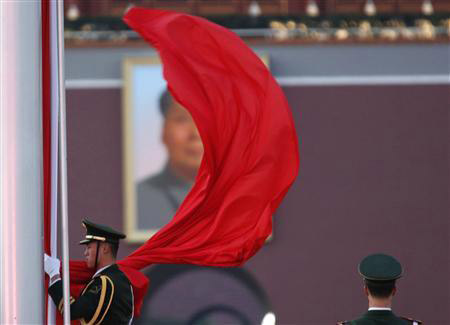当前位置: Language Tips> 双语新闻
China vows 'decisive' role for markets, results by 2020

|
查看原文 China aims to achieve "decisive results" in its reform push by 2020, with economic changes a central focus of overall reforms, the ruling Communist Party said in a communiqué released by state media at the end of a four-day closed-door meeting of the party's 205-member Central Committee. "The core issue is to straighten out the relationship between government and the market, allowing the market to play a decisive role in allocating resources and improving the government's role," the party said in its statement. It added that it would set up a central leading team for "comprehensively deepening reform," responsible for "designing reform on an overall basis, arranging and co-ordinating reform, pushing forward reform as a whole, and supervising the implementation of reform plans". In previous policy statements, the Communist Party had often described markets as playing a "basic" role in allocating resources, Xinhua news agency said, meaning the new language amounts to an upgrading of its role in the party philosophy. "They are looking to break away from government control, allowing the markets to take the lead. In the past, prices and investment decisions were predominantly made by the government," said Dong Tao, Asia ex-Japan chief regional economist with Credit Suisse in Hong Kong. "This is a revolutionary philosophy, by Chinese standards." Still, the party did not issue any bold reform plans for the country's state-owned enterprises (SOEs), saying that while both state firms and the private sector were important and it would encourage private enterprise, the dominance of the "public sector" in the economy would be maintained. While the statement was short on details, it is expected to kick off specific measures by state agencies over the coming years to reduce the role of the state in the economy. Historically, such third plenary sessions of a newly installed Central Committee have acted as a springboard for key economic reforms, and this one will also serve as a first test of the new leadership's commitment to reform. Among the issues singled out for reform, the party said it would work to deepen fiscal and tax reform, establish a unified land market in cities and the countryside, set up a sustainable social security system, and give farmers more property rights - all seen as necessary for putting the world's second-largest economy on a more sustainable footing. Out of a long list of areas that the meeting was expected to tackle, most analysts have singled out a push towards a greater role of markets in the financial sector and reforms to public finances as those most likely to get immediate attention. As part of that, Beijing is expected to push forward with capital account convertibility, and the 2020 target date for making significant strides on reform could set off expectations that the government will be looking to achieve breakthroughs on freeing up the closely managed yuan by then. Few China watchers had expected Xi and Li to take on powerful state monopolies, judging that the political costs of doing so were just too high. Many economists argue that other reforms will have only limited success if the big state-owned firms' stranglehold on key markets and financing is not tackled. But instead, the focus will be on indirect steps to limit the power of state behemoths and open up space for nimbler, private and foreign rivals - opening up key markets to private and foreign investment and deregulation tested in free trade zones. Some reforms could face stiff resistance from powerful interest groups such as local governments or state-owned monopolies, people involved in reform discussions have said. |
路透社11月12日报道,中国执政党12日公布了今后十年的改革议程,保证将使市场在资源配置中起决定性作用,并将对中国——世界第二大经济体实行彻底改革以推动其未来的发展。 中国共产党在官方媒体发布的十八届三中全会公报上指出,中国的目标是到2020年在推动改革上取得“决定性成果”,也指出经济体制改革是全面深化改革的重点。日前,由205名委员组成的中央委员会在北京参加了四天的非公开会议。 公报指出,核心问题是处理好政府和市场的关系,使市场在资源配置中起决定性作用和更好地发挥政府的作用。
不过,中国共产党并没有公布针对国企改革的大胆方案,公告指出国有企业和私营部门都很重要,它会鼓励私营企业,而“国营部门”在经济中的支配作用也将继续保持下去。
参与改革讨论的人们表示,一些改革可能会面临强大利益集团(如当地政府或国有垄断企业)的顽强抵抗。 (译者 lyyzk09 编辑 丹妮) |
上一篇 : “海燕”过境 菲律宾救灾压力重重
下一篇 : 为何人人关心十八届三中全会
关注和订阅


电话:8610-84883645
传真:8610-84883500
Email: languagetips@chinadaily.com.cn